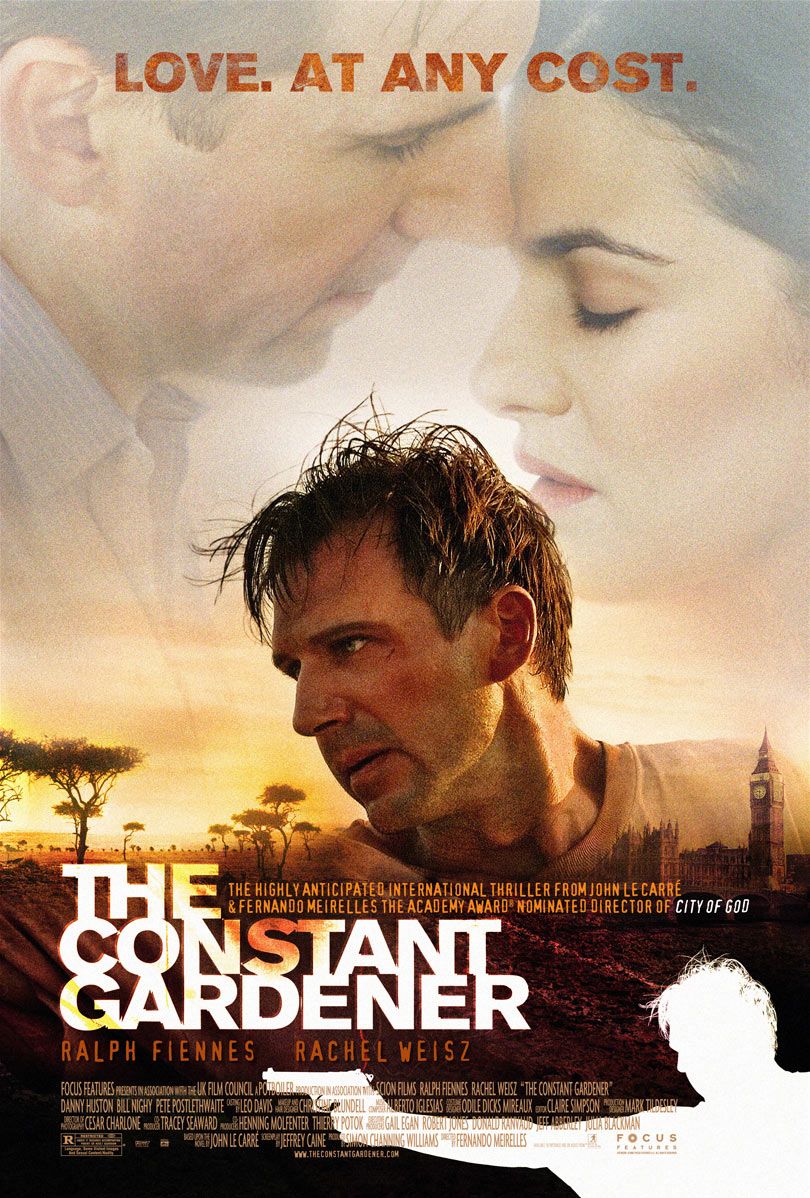Summary:
After his wife is murdered, a British Diplomat living in Africa embarks on a quest to find out why, along the way uncovering a conspiracy that could have deadly impact.
My Thoughts:
While I was watching “The Favourite” (2018), I thought to myself, “Dang, Rachel Weisz can act!” I knew that she had won Best Supporting Actress for this film, “The Constant Gardener”, so I made a mental note that I should check it out some point in the future. Then coincidentally, not more than a month after I saw “The Favourite”, I stumbled across this on Netflix and decided to give it a go.
It’s a pretty darn solid flick.
“There are no murders in Africa, only regrettable deaths.”
Justin Quayle (Ralph Fiennes, “In Bruges”) is a mild mannered British Diplomat living in Africa. His wife, Tessa (Rachel Weisz, “Disobedience”), is an outspoken activist, one who frequently gets into hot water. On the way home from one of her trips, Tessa is murdered, along with her colleague, a doctor. After his wife’s funeral Quayle begins going through his wife’s things and finds a number of questionable letters and documents that lead him to believe his wife’s murder might not have been carried out by random bandits, as the authorities originally claimed, but that she might have been purposefully murdered for reasons unknown. Quayle embarks on a quest across Africa for the truth.
Alright, so, the thing that brought me here was Rachel Weisz, and she does a marvelous job in this film; it’s really no wonder that she won an Oscar for this movie. Tessa is a complex character, one that we get to know through Quayle’s flashbacks. She is first and foremost a loveable character- this movie is partly a romance. After the initial few scenes, which depict the aftermath of Tessa’s murder, we spend the first half hour or so watching as Quayle and Tessa fall in love, which then makes it that much more heartbreaking as Quayle then goes through Tessa’s things. Weisz is able to play up the coy intriguing aspects of Tessa while still maintaining a romantic disposition towards Quayle. It’s obvious she loves him, even if she is hiding things. Fiennes is pretty great in this film as well; it’s nice to see him playing the good guy again (He was the good guy in “English Patient” and “Grand Budapest Hotel”, I guess, but then he was Voldemort in the Harry Potter movies, the Nazi in charge of the concentration camp in “Schindler’s List”, Heathcliff in “Wuthering Heights”, and even Hades in the “Clash/Wrath of the Titans” reboots- point is I’m more accustomed to a bad Ralph than a good one). Again, as I’m used to seeing him play the bad guy it’s always a shock to me when I see him act with such compassion and tenderness, but he can really sell emotion.
Another thing I really liked in this film (really this is not something I mention all that often unless it really grabs my attention) was the editing. There was a lot of chaotic, almost jumbled editing in this film that was jarring but it simultaneously drew me in. The camera jumps all over the place, seldom focusing on just the protagonist for very long. The film is more intent on painting a picture of Africa that just following Ralph on his quest. So for example, when he walks through a market, as he talks to another person, the camera doesn’t stay on only them; it jumps around and looks at the different wares that are being sold, it follows around some young children, or shows you a beggar on a mat… The way this film crafts the world around it really enriches the story, and creates and incredibly vibrant world, it also has a greater impact when the story starts to reveal the stakes of what has happened.
(Some Spoilers in the Following Paragraph)
I’m going to try to shy away from too many spoilers, because this was a really good film, and I do think it’s worth a view. About halfway through the movie it becomes sort of obvious that Tessa was murdered to cover up something she found that had to do with a pharmaceutical company (I wont reveal more). The film goes deeper and deeper into a web of lies and deceit and Ralph finds himself more compelled to act as he uncovers more secrets. While the first half of this film has a few slower moments (I won’t lie, I found myself browsing my phone for a brief moment and had to rewind a scene), the second half of this film really ramps up. There are revelations that heighten the tension with every scene, and we get to watch as Ralph’s character changes before our eyes from a mild mannered man to a man hell-bent on finding the truth. Quayle is such a dynamic character- it’s impossible not to root for him. I found the way the film progressed in the second half of the second act and beyond to be nigh Hitchcockian; revelations just kept coming with increasing weight, ramping up tension as we went. While I admit I was a smidge disinterested during one or two of the scenes near the beginning, by the end this film had my full attention.
Verdict:
This is a really intelligent thriller with a surprising amount of heart and emotion, and an important message to boot. Weisz absolutely deserved her Oscar for this film, but the film as a whole deserves a lot of recognition too. This movie paints a vivid picture of Africa, it has an increasingly tense storyline, and it has a really important message about how, in the words of this film: “big pharmaceuticals are right up there with the arms dealers.” This film is based on a novel, not a true story, but the point it is making is absolutely valid.
Review Written By:






